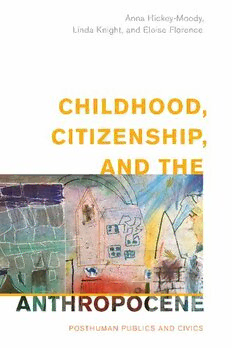
Childhood, Citizenship, and the Anthropocene: Posthuman Publics and Civics PDF
Preview Childhood, Citizenship, and the Anthropocene: Posthuman Publics and Civics
Childhood, Citizenship, and the Anthropocene Children and Young People in the Anthropocene Series Editors: Peter Kelly, Peter Kraftl, Diego Carbajo Padilla, Veronica Pacini-Ketchabaw and Kate Tilleczek This series seeks to examine, exemplify and problematise the ways in which childhood and youth are entangled with the Anthropocene. The series is multidisciplinary – bring- ing together, drawing on and exploring various intersections and entanglements between, sociologies of childhood, youth, education, work, well-being; children’s and young peo- ple’s geographies; feminist and post-feminist theories and methodologies; new materialist and posthuman theories and methodologies. It engages with an array of critical theoreti- cal, methodological and empirical challenges and opportunities that emerge when thinking about children, young people and the Anthropocene. Titles in the Series Childhood, Citizenship, and the Anthropocene: Posthuman Publics and Civics Anna Hickey-Moody, Linda Knight and Eloise Florence Childhood, Citizenship, and the Anthropocene Posthuman Publics and Civics Anna Hickey-Moody, Linda Knight and Eloise Florence ROWMAN & LITTLEFIELD London • New York Credits and acknowledgements for material borrowed from other sources, and reproduced with permission, appear on the appropriate page within the text. Published by Rowman & Littlefield An imprint of The Rowman & Littlefield Publishing Group, Inc. 4501 Forbes Boulevard, Suite 200, Lanham, Maryland 20706 www .rowman .com Copyright © 2021 by Anna Hickey-Moody, Linda Knight and Eloise Florence All rights reserved. No part of this book may be reproduced in any form or by any electronic or mechanical means, including information storage and retrieval systems, without written permission from the publisher, except by a reviewer who may quote passages in a review. British Library Cataloguing in Publication Information Available Library of Congress Cataloguing-in-Publication Data Names: Hickey-Moody, Anna, 1977– author. | Knight, Linda, author. | Florence, Eloise, author. Title: Childhood, citizenship, and the anthropocene : posthuman publics and civics / Anna Hickey-Moody, Linda Knight, Eloise Florence. Description: Lanham : Rowman & Littlefield Publishing Group, [2022] | Series: Children and young people in the anthropocene | Includes bibliographical references and index. | Summary: “This book mobilizes the theoretical resources offered by theories of little publics and posthuman civics to consider what it means to be a child in the Anthropocene” —Provided by publisher. Identifiers: LCCN 2021033736 (print) | LCCN 2021033737 (ebook) | ISBN 9781538153604 (cloth) | ISBN 9781538153611 (epub) Subjects: LCSH: Childhood—Social aspects. | Geology, Stratigraphic—Anthropocene. | Human beings. Classification: LCC HQ767.9 .H53 2022 (print) | LCC HQ767.9 (ebook) | DDC 305.23—dc23 LC record available at https://lccn.loc.gov/2021033736 LC ebook record available at https://lccn.loc.gov/2021033737 ∞ ™ The paper used in this publication meets the minimum requirements of American National Standard for Information Sciences – Permanence of Paper for Printed Library Materials, ANSI/NISO Z39.48-1992. Anna and Eloise would like to dedicate this book to the children of the Anthropocene. Linda would like to dedicate this book to Hannah, who makes beautiful art. Contents Acknowledgements ix 1 Mapping Key Debates in Childhood Studies and Posthumanism 1 2 Posthuman Publics 21 3 Posthuman Civics 41 4 Methods: Enacting Publics and Civics 59 5 Urban Publics 79 6 Urban Civics 111 7 Climate Change and the End of Childhood 133 8 Participatory Community-Building with Transnational Others 167 9 New Geographies of Praxis 187 Notes 201 Bibliography 203 Index 215 vii Acknowledgements We would like to thank Fiona Hillary for sparking our own consolidation of work on this subject. In 2019 Anna Hickey-Moody brought Professor Rosi Braidotti to Media and Communication RMIT, and Fiona worked to co-host this visit by sourcing funding from the School of Art. Fiona curated a series of workshops on Posthuman Publics as part of the Masters of Art in Public Space at RMIT. These workshops were framed as ‘laboratories’ and explored the theme of posthuman publics. Anna and Rosi ran a workshop day, and the lecture Anna delivered to this cohort inspired chapter 2 in this book. The full programme for the Posthuman Publics laboratory series can be viewed here: https :/ /ar t .rmi t .edu .au /n ews /p osthu m an -p ublic s We would like to thank all the research staff employed in the Interfaith Childhoods project, especially Dr Kate Lonie, Robina Akhter Uller, Dr Joanna Dennis, Thu Le, Dr Christine Horn, Shabana Baig, Dr Angelica Harris-Faull, Marissa Willcox, Dr Mia Harrison, Lucian Marine, Zoe Walshe, Anne-Marie Atkinson, Beverly Irving, Tia Roko, and Katerina Eleftheriadou. Thanks to the Department of Gender and Cultural Studies at the University of Sydney; the Department of Sociology at Goldsmiths, London; and the Education and Social Research Institute at Manchester Metropolitan University for host- ing the project outside Melbourne. Thanks to the Department of Media and Communication at RMIT University and the Digital Ethnography Research Centre. Huge thanks to the now 500+ individuals who have participated in the project. Thanks also to Felicity Colman, Joanna Hodge, Maggie McLure, Harry Torrance, Kate Pahl, Rebecca Coleman, Les Back, David Rousell, Nancy Lesko, Dave Griffiths, Dan Harris, Kat Jungnickel, and Natalya Lusty. The project is funded by Australian Research Council Future Fellowship FT16010023 ‘Early start arts to counter radicalization’ and an RMIT Vice Chancellor’s Senior Research Fellowship. All names of participants are ix
